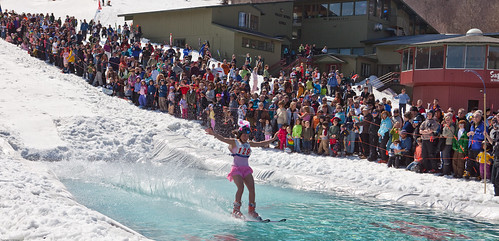Are You Always Colder With Exercise In Cold Water?
Tuesday, January 05, 2010
Jolie Bookspan, M.Ed, PhD, FAWM
 Although you lose a high amount of body heat to moving water, it is also true that you gain heat from being alive and from moving. The more heat you can generate, the more it is likely to meet or exceed the amount you lose. Losing heat by itself does not mean that you are chilling. If you generate more than you lose, you do not chill, you can stay warm when swimming and diving, even overheat. If not, of course, you can get very cold.
Although you lose a high amount of body heat to moving water, it is also true that you gain heat from being alive and from moving. The more heat you can generate, the more it is likely to meet or exceed the amount you lose. Losing heat by itself does not mean that you are chilling. If you generate more than you lose, you do not chill, you can stay warm when swimming and diving, even overheat. If not, of course, you can get very cold.In general, it is easier to chill than overheat in cold water. However, in some cases, you can generate enough heat through exercise to match or surpass the heat you lose, even moreso if you are well insulated with muscle and fat. Swimmers doing laps in pools and divers sweating into their masks during hard finning against currents can tell you that. During Desert Storm, some divers in the Persian Gulf needed to wear ice vests for heat extraction to prevent overheating.
 Many factors are involved including your fitness (ability to exercise hard enough to make enough heat), your build, your clothing, medicines you may be taking, how far it is to safety, your health, how warm you were when you started, the weather, water current and conditions. You can have net loss and gain back and forth during the same swim. Much to know.
Many factors are involved including your fitness (ability to exercise hard enough to make enough heat), your build, your clothing, medicines you may be taking, how far it is to safety, your health, how warm you were when you started, the weather, water current and conditions. You can have net loss and gain back and forth during the same swim. Much to know.When I competed in swimming, we swam miles each day. In winter, after finishing pool training, I walked home, hair still dripping. A fun thing was to see how fast it would freeze. When I'd pat the top of my head, the frozen hair crackled humorously. You could hold locks out to freeze in shapes. Teammates and I experimented informally, running various speeds to see if the wind froze the hair more or our rising body heat could melt it. Some of us were able to generate a literal head of steam. Most of my training was pool swimming (wimpy) but I have tried ice swimming in no more than a bathing suit. My family were Russian Ice swimmers and my Grandfather was the oldest member of the Iceberg club, who swam in the ocean every day, including New Year's Day. I am trying to find any photos that may have been taken. I know the club and my Grandfather were pictured in an issue of Strength and Health magazine.
In my military work in cold survival, we used computer models to compare heat loss in critically cold water scenarios for downed pilots and combat swimmers, to our real experiments putting volunteers in cold water with lots of forced convection - waves, wind, overhead spray, and my little toy wind-up sharks and penguins. You can become incapacitated by cold before becoming hypothermic. You can die from cold incapacitation in the water without ever reaching a hypothermic state. In informal conversation, the terms hypothermia and chilling are often used interchangeably, but that is not correct, and they are not the same. I made t-shirts for "my guys" the military volunteers in each extreme experimental protocol. The cold immersion trial shirts were inspired by the verse "Many are called but few are chosen" to become, "Many are cold but few are frozen."
More On Surviving Cold:
- Sixteen Miles of Cold Water
- Getting Fitter in 50 Degrees
- Beware of Hype in Training Methods
- Do You Lose Most Of Your Heat Through Your Head?
- Swimming and Pulmonary Edema Part I
- Japanese Ama Divers - Cold, Clothing, and Children
- Diver Down Flags - Boating, Swimming, SCUBA Safer and Smarter
- Better Stretches for Swimming - Cook Strait Update
- Lower Back Pain From Swimming and SCUBA
- Nutrition for Endurance Swim Training
---
Read success stories of these methods and send your own.
See if your answers are already here by clicking labels, links in posts, archives, and The Fitness Fixer Index. Subscribe free, click "updates via e-mail" upper right.
For personal medical questions - Replies to Medical Questions. Limited Class space for personal feedback. Top students may apply for certification through DrBookspan.com/Academy. Get more in Dr. Bookspan's Books.
Read success stories of these methods and send your own.
See if your answers are already here by clicking labels, links in posts, archives, and The Fitness Fixer Index. Subscribe free, click "updates via e-mail" upper right.
For personal medical questions - Replies to Medical Questions. Limited Class space for personal feedback. Top students may apply for certification through DrBookspan.com/Academy. Get more in Dr. Bookspan's Books.
Labels: cold, military fitness, myths, scuba, swimming

0 Comments:
Post a Comment
<< Home